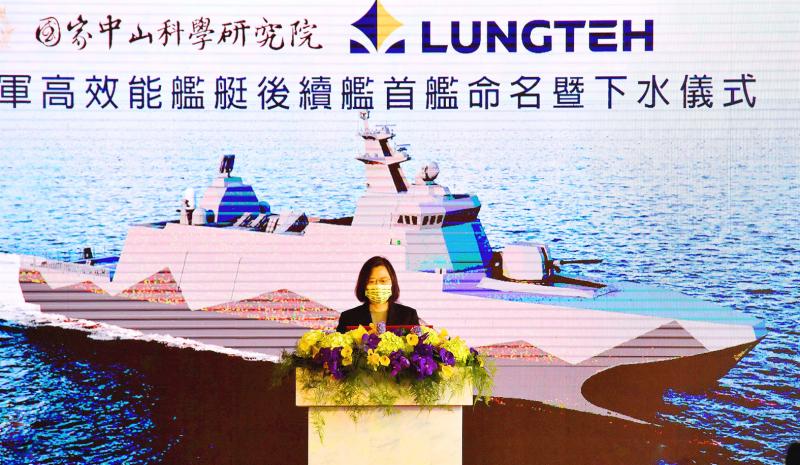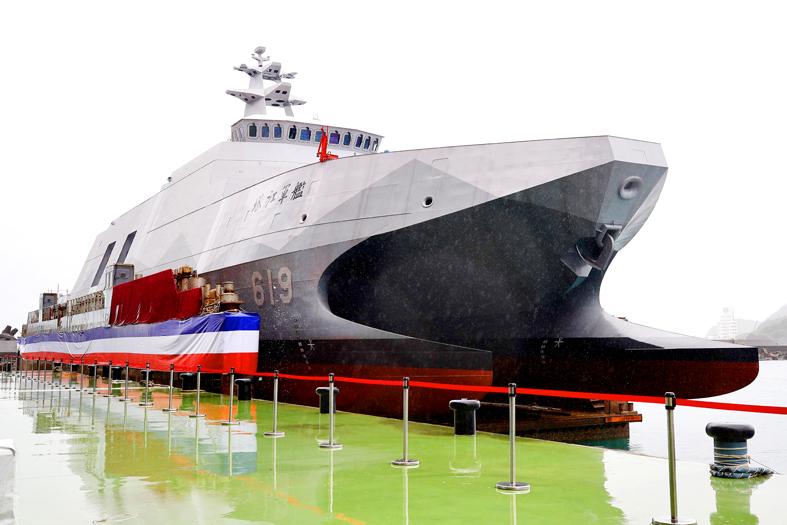Taiwan might become a supplier of weapons to Western democracies, President Tsai Ing-wen (蔡英文) said yesterday, praising the nation’s improving weapons design ability as she launched an advanced, missile-laden warship and commissioned a new minelayer.
Tsai has made boosting the defense of the nation a priority in the face of a growing military challenge from Beijing, which has never renounced the use of force to bring Taiwan under its control.
While the nation’s air force has benefited from big-ticket imported items such as new and upgraded F-16s, the navy is Tsai’s next focus, with submarines in production and the first of a fleet of highly maneuverable stealth corvettes launched yesterday.

Photo: CNA
The new Tuo Chiang-class corvettes, a prototype of which is already in operation, have been dubbed “aircraft carrier killers” by the navy, due to their complement of anti-ship missiles. They can also carry Sky Sword anti-aircraft missiles.
In a speech at Lung Teh Shipbuilding Co’s (龍德造船) shipyard in Yilan County’s Suao Township (蘇澳), Tsai said Taiwan is beginning to see the results of her administration’s policy of pursuing self-sufficiency in national defense capability.
A long series of developments, including the start of construction on a domestic submarine and the handover of new patrol ships and minelayers, show that indigenous defense manufacturing is making “thorough and comprehensive” progress, Tsai said.

Photo: Ritchie B. Tongo, EPA-EFE
During her speech marking the launch of the Ta Chiang (塔江艦) — the first mass-produced Tuo Chiang-class ship — Tsai said the vessel, as well as a new minelayer developed for the navy, would deter attacks and showcase Taiwan’s research and development ability.
“We have the determination and capability to complete the task of building our own ships, letting the world see our defense research and development energy,” Tsai said.
The Ta Chiang’s name contains a reference to the Tawa River (塔瓦溪) in Taitung County, which forms the ancestral hunting grounds of the Paiwan people, while also alluding to the vessel’s symbolic role as a “tower” (塔) on the front line of the nation’s defense, the navy said.
The minelayer has a maximum speed of 14 knots (26kph) and a displacement of 347 tonnes.
It is equipped with a T-75 20mm cannon and T-74 machine guns, as well as a domestically developed minelaying system, the navy said.
“In the future, we might also become a supply source of related equipment and components in Western democracies, driving the upgrading of the defense industry,” Tsai said.
The US is Taiwan’s main foreign source of weapons. Most countries shy away from arming Taiwan, wary of angering Beijing and losing valuable commercial contracts with the world’s second-largest economy.
Tsai, re-elected by a landslide in January on a vow to stand up to China, has championed the concept of “asymmetric warfare,” focusing on high-tech, mobile weapons designed to make any Chinese attack as difficult as possible.
She has bolstered the domestic arms industry to try to make Taiwan as self-sufficient as possible.

ACTION PLAN: Taiwan would expand procurement from the US and encourage more companies to invest in the US to deepen bilateral cooperation, Lai said The government would not impose reciprocal tariffs in retaliation against US levies, President William Lai (賴清德) said yesterday, as he announced five strategies to address the issue, including pledging to increase Taiwanese companies’ investments in the US. Lai has in the past few days met with administrative and national security officials, as well as representatives from various industries, to explore countermeasures after US President Donald Trump on Wednesday last week announced a 32 percent duty on Taiwanese imports. In a video released yesterday evening, Lai said that Taiwan would not retaliate against the US with higher tariffs and Taiwanese companies’ commitments to

Intelligence agents have recorded 510,000 instances of “controversial information” being spread online by the Chinese Communist Party (CCP) so far this year, the National Security Bureau (NSB) said in a report yesterday, as it warned of artificial intelligence (AI) being employed to generate destabilizing misinformation. The bureau submitted a written report to the Legislative Yuan in preparation for National Security Bureau Director-General Tsai Ming-yen’s (蔡明彥) appearance before the Foreign Affairs and National Defense Committee today. The CCP has been using cognitive warfare to divide Taiwanese society by commenting on controversial issues such as Taiwan Semiconductor Manufacturing Co’s (TSMC, 台積電) investments in the

HELPING HAND: The steering committee of the National Stabilization Fund is expected to hold a meeting to discuss how and when to utilize the fund to help buffer the sell-off The TAIEX plunged 2,065.87 points, or 9.7 percent, to close at 19,232.35 yesterday, the highest single-day percentage loss on record, as investors braced for US President Donald Trump’s tariffs after an extended holiday weekend. Amid the pessimistic atmosphere, 945 listed companies led by large-cap stocks — including Taiwan Semiconductor Manufacturing Co (TSMC, 台積電), Hon Hai Precision Industry Co (鴻海精密) and Largan Precision Co (大立光) — fell by the daily maximum of 10 percent at the close, Taiwan Stock Exchange data showed. The number of listed companies ending limit-down set a new record, the exchange said. The TAIEX plunged by daily maxiumu in just

‘COMPREHENSIVE PLAN’: Lin Chia-lung said that the government was ready to talk about a variety of issues, including investment in and purchases from the US The National Stabilization Fund (NSF) yesterday announced that it would step in to staunch stock market losses for the ninth time in the nation’s history. An NSF board meeting, originally scheduled for Monday next week, was moved to yesterday after stocks plummeted in the wake of US President Donald Trump’s announcement of 32 percent tariffs on Taiwan on Wednesday last week. Board members voted to support the stock market with the NT$500 billion (US$15.15 billion) fund, with injections of funds to begin as soon as today. The NSF in 2000 injected NT$120 billion to stabilize stocks, the most ever. The lowest amount it